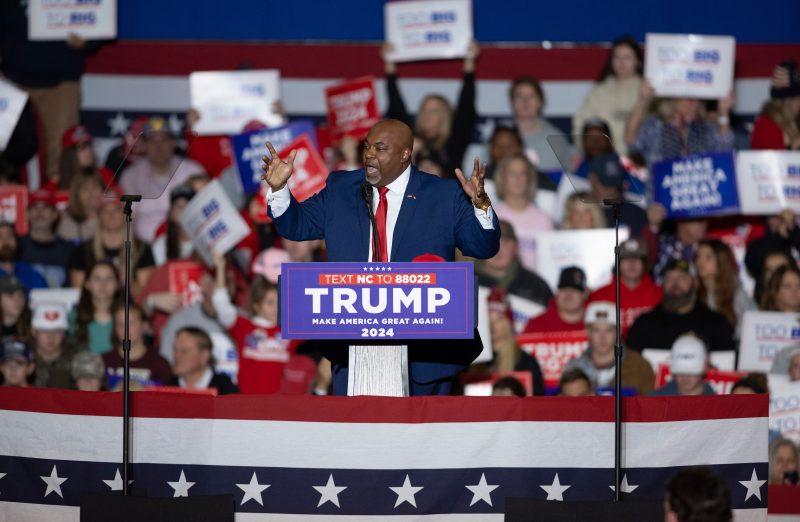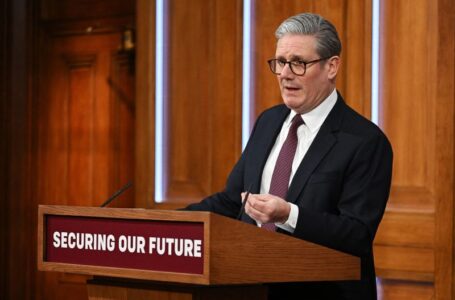Tens of thousands rally in massive anti-corruption protest against Serbian government
Who is North Carolina Republican gubernatorial candidate Mark Robinson?


North Carolina Lt. Gov. Mark Robinson, the leading Republican in the party’s primary in the gubernatorial race, made headlines over the weekend for receiving the endorsement of Donald Trump — with the former president saying he is “Martin Luther King on steroids” — and for having a history of making anti-LGBTQ+, Islamophobic and antisemitic statements.
Robinson is one of three Republicans seeking their party’s nomination in the North Carolina gubernatorial race, which is likely to be one of the biggest and most pivotal races for a governor’s mansion in the country in November. On Tuesday, Robinson is favored to defeat his two Republican opponents and advance to the general election, in which he is likely to face Attorney General Josh Stein (D), the candidate favored to win his party’s primary. They are running to replace Gov. Roy Cooper (D), who is term-limited.
The race — which is expected to be one of the most expensive gubernatorial elections this year — will determine whether Republicans recapture a gubernatorial seat they lost seven years ago to the popular Cooper, who defeated incumbent Gov. Pat McCrory (R). The GOP has swept Senate and presidential races in the Tar Heel State in recent years, yet Democrats have won the governor’s mansion in seven of the past eight election cycles.
For his part, Robinson has not shied away from embracing Trump and his rhetoric — making a possible matchup between him and Stein a microcosm of national politics and echoing many of the similar themes in what is expected to be a presidential rematch between Trump and President Biden.
Robinson, 55, is a conservative Christian with Trump-like appeal — a charismatic, brazen outsider who burst onto the political scene just a few years ago with a viral video. To others, he is a glaring liability in a battleground race where centrist voters are influential, and critics are alarmed at what he could do in the state’s top job.
Here’s what you need to know about Mark Robinson.
Robinson defeated former North Carolina state lawmaker Yvonne Lewis Holley in the 2020 race for lieutenant governor in North Carolina. Before that, he worked in furniture manufacturing.
His career in politics began in 2018, when he went viral after delivering a fiery pro-gun speech at the Greensboro City Council. The NRA invited him to appear in ads and speak at its convention that year, and soon he became a favorite in North Carolina GOP circles. By 2019, he had entered the GOP primary for lieutenant governor, winning the party’s nomination without the need for a runoff and by defeating several career politicians in the race.
After winning the general election, he became North Carolina’s first Black lieutenant governor.
Robinson has often alluded to a family story of hardship and perseverance that now features in his gubernatorial campaign pamphlets. They introduce Robinson as the ninth of 10 children who grew up amid poverty, alcoholism and domestic abuse and note that, at multiple points, he declared bankruptcy.
“Only in America could a story like that exist, and I just count it as a huge blessing from God,” Robinson said.
Robinson has a years-long history of making inflammatory, antisemitic and sexist comments online.
In 2018, he called school shooting survivors “media prosti-tots” for advocating for gun-control policies. The year before, he mocked a Harvey Weinstein accuser. He once claimed that accepting homosexuality would lead to pedophilia and “the END of civilization as we know it.” He recently suggested that transgender people should be arrested for their bathroom choice. He has repeatedly used antisemitic tropes. He has also embraced false claims that former president Barack Obama was not born in the United States.
Robinson signaled that he’s trying to move past his most inflammatory comments and campaign with a focus on issues such as the economy.
“It’s sad but not surprising that there’s no low the Democrats and their allies in the media won’t stoop to smear Mark Robinson,” Robinson campaign spokesman Mike Lonergan said in a statement to The Washington Post. He said Robinson presents a sharp contrast with Stein as “a conservative outsider” who understands voters’ economic struggles and “will work every day to make our state a better place to live, work and raise a family.”
Supporters, meanwhile, are largely shrugging off the reporting on Robinson’s most outrageous comments as smear jobs and “fake news.” When asked about one of Robinson’s most scrutinized Facebook posts — a 2018 screed against the film “Black Panther” that references Israeli currency and uses a Yiddish slur for Black people — Ed Broyhill, a Republican national committeeman from North Carolina, said, “I can’t help but think that that’s been manufactured by some opposition.” The post is still accessible online.
Robinson says he has “never been antisemitic,” and allies point to his trip to Israel last fall and talks with Jewish leaders as evidence he has sought to address concerns.
The lieutenant governor also drew scrutiny over his campaign finances.
Robinson said he was “humbled” by Trump’s endorsement and that he looked forward to leading “our united Republican ticket to victory in November, and get our state and country back on track.” Trump once described Robinson as “one of the hottest politicians” in the country, and at this past weekend’s rally recalled that he was not sure Robinson liked being compared to Martin Luther King Jr. Robinson has criticized King as a “communist.”
Before gaining statewide standing, Robinson expressed his political views on Facebook — raging against the political left with memes and insults. He often chafed at assumptions that Black people were Democrats, and he railed against Obama’s unconventional presidential portrait — “a reflection of the nightmare of Marxist Socialism.” He joked that DACA, the Deferred Action for Childhood Arrivals program for undocumented immigrants who arrived in the United States as children, actually stood for “Dumb Ass Communist Americans.”
Robinson built an ultraconservative portfolio, standing against gun control and reproductive rights. He repeatedly attacked the LGBTQ+ community, raged against “diversity, equity and inclusion” efforts in schools and lashed out against the media. Democrats are already focusing campaign arguments on Robinson’s record on abortion.
“I don’t care if you’re 24 hours pregnant. I don’t care if you’re 24 weeks pregnant. I don’t care. If you kill that young ’un, it is murder,” Robinson told a church in 2021. Robinson has said he paid for the abortion of his “unborn child” in 1989 — a decision that he says was wrong.
He “will be the most extreme candidate that is nominated for governor by either party in the last 50 years in North Carolina,” said Morgan Jackson, chief strategist for Stein, the state attorney general who is likely to face Robinson in the fall.
While Robinson said he’s excited to lead Republicans on the ticket next to Trump come November, plenty of Republican officials in North Carolina are uneasy about that prospect.
There’s a sense that “while he may be the voice of the party, he’s not the voice of North Carolina,” said Jonathan Bridges, who managed GOP former congressman Mark Walker’s now-shuttered campaign for governor.
Republicans are keen on getting the governor’s mansion back after their party has swept Senate and presidential races in the Tar Heel State in recent years. Despite that, Democrats have won the governor’s mansion in seven of the past eight election cycles.
And the last Republican governor, McCrory, faced massive blowback for signing a 2016 bill that required transgender people to use the bathroom matching their sex at birth. The law cost the state billions in business and was ultimately repealed. Robinson’s critics say he will regret pushing LGBTQ+ issues to the forefront again.
Republicans running against him have tried to convince others in their parties that Robinson is bad for the GOP brand in North Carolina. Attorney Bill Graham said he jumped into the gubernatorial race believing that national Republicans would help sideline Robinson, and he felt betrayed when they didn’t step in. “They’ll just play the Mark Robinson top-10 hit parade. They won’t need to say a word,” said Graham, predicting the Democratic strategy if Robinson is the nominee.
Graham said he met with the Republican Governors Association last summer to explore a candidacy — offering himself as an alternative but arguing that he could succeed only with major third-party spending against Robinson.
“The RGA was worried about Robinson. They may deny that, but they were,” Graham said.
Courtney Alexander, a spokeswoman for the RGA, said the group has “traditionally stayed out of non-incumbent primaries” and “has had no involvement” in the GOP contest in North Carolina. She said that the RGA has met with all of the Republican candidates and that any of them would be a stark contrast to the likely Democratic nominee.











